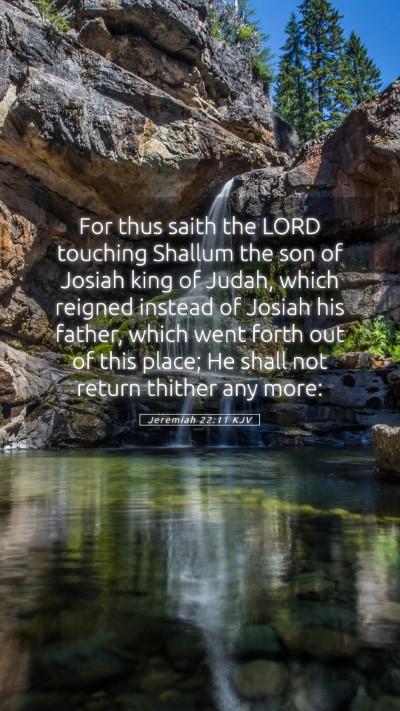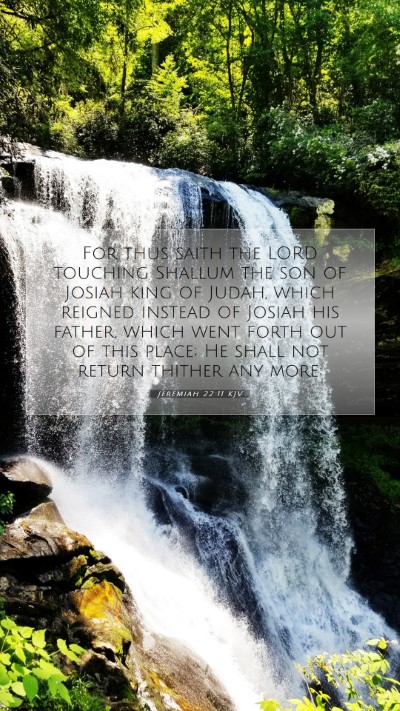Understanding Jeremiah 22:11 - Bible Verse Commentary
Scripture Reference: Jeremiah 22:11 (KJV) - "For thus saith the LORD touching Shallum the son of Josiah king of Judah, which reigned instead of Josiah his father, which went forth out of this place; He shall die in the place whither they have led him captive."
Overview of the Verse
This verse serves as a prophetic warning regarding Shallum, also known as Jehoahaz, who succeeded his father, King Josiah. Jeremiah's prophecy is significant, as it encapsulates the themes of leadership failure and the consequences of the nation's sin.
Insights from Public Domain Commentaries
1. Matthew Henry's Commentary
Matthew Henry emphasizes the importance of righteousness in leadership. He explains that Shallum's reign was marked by a departure from the godly example set by his father, Josiah. Henry suggests that this lack of divine favor leads to Shallum's impending doom and illustrates a common biblical theme: leaders are accountable to God for their actions and the direction they lead their people.
2. Albert Barnes' Notes on the Bible
Albert Barnes provides historical context regarding Shallum’s short reign and subsequent captivity. He notes that Shallum is warned that his lineage will be cut off as a result of his sinful actions and the sins of the people of Judah. Barnes highlights the manifest judgment of God reflected in the prophet’s words, stressing that the consequences of rebellion against God are severe and inevitable.
3. Adam Clarke’s Commentary
Adam Clarke points out that the name "Shallum" means "retribution" or "recompense," which he views as symbolically fitting for the king's fate. Clarke elaborates that the prophecy serves not only as a warning to Shallum but also as a lesson for all leaders about the necessity of just and righteous governance. He further explains that Shallum’s captivity and death demonstrate the tragic outcome of neglecting one’s responsibilities as a leader.
Key Themes and Lessons
- Divine Judgment: The verse highlights God's sovereignty and judgment on leaders who fail to lead their people with righteousness.
- Accountability: Leaders are held accountable for their actions and decisions, impacting not only their fate but also the fate of those they govern.
- Prophetic Warning: Jeremiah’s prophecy serves as a dire warning against complacency and sin.
- Legacy of Righteous Leadership: The importance of a godly legacy is underscored through the contrast between Josiah’s reign and that of Shallum.
Applying Jeremiah 22:11 to Daily Life
This verse can be applied to various aspects of life, especially in the understanding of leadership roles, whether in the church, family, or community. It teaches the importance of ethical leadership and the necessity for leaders to seek divine wisdom and guidance.
Cross References
- 2 Kings 23:30: Discusses Shallum's ascension after Josiah's death.
- 2 Chronicles 36:2-4: Details about Jehoahaz's brief reign and subsequent captivity.
- Jeremiah 13:18: A warning directed at the king and the consequences of pride and rebellion against God.
Conclusion
Jeremiah 22:11 serves as a profound reminder of the consequences of ungodly leadership and rebellion against God. It challenges readers to reflect on the significance of righteous leadership and the impact it has on a community. Through a combination of insights from Matthew Henry, Albert Barnes, and Adam Clarke, we gain a deeper understanding of this critical verse, its historical context, and its application in today’s world.
For further exploration, Bible study groups can delve into this passage using various Bible study tools and resources, ensuring a rich understanding of Scripture.


